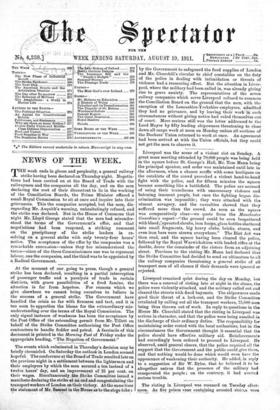Liverpool remained quiet during the day on Monday, but there
was a renewal of rioting late at night in the slums, the police were violently attacked, and the military called out and cleared the streets with fixed bayonets. The shipowners made good their threat of a lock-out, and the Strike Committee retaliated by calling out all the transport workers, 75,000 men being thus thrown out of work. In reply to questions in the House Mr. Churchill stated that the rioting in Liverpool was serious in character, and that the police were being assailed in the discharge of their ordinary duties. The responsibility for maintaining order rested with the local authorities, but in the circumstances the Government thought it essential that the police should have effective military aid. Reinforcements had accordingly been ordered to proceed to Liverpool. He observed, amid general cheers, that the police required all the support that the, Government and the public could give them, and that nothing would be done which would even have the appearance of weakening their authority. He added, in reply to a suggestion of Sir W. Byles, that he believed it to be altogether untrue that the presence of the military had exasperated the people; on the contrary, it had averted serious trouble.


































